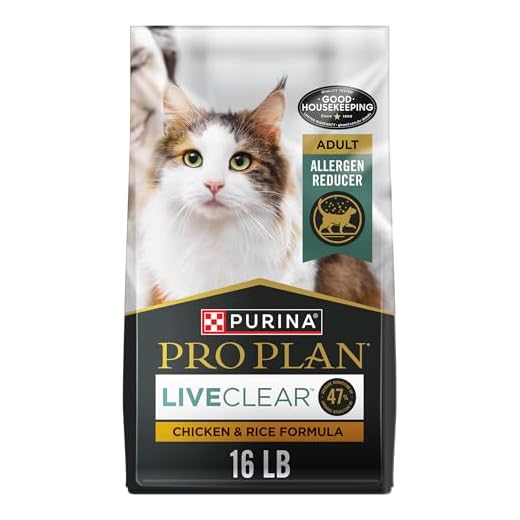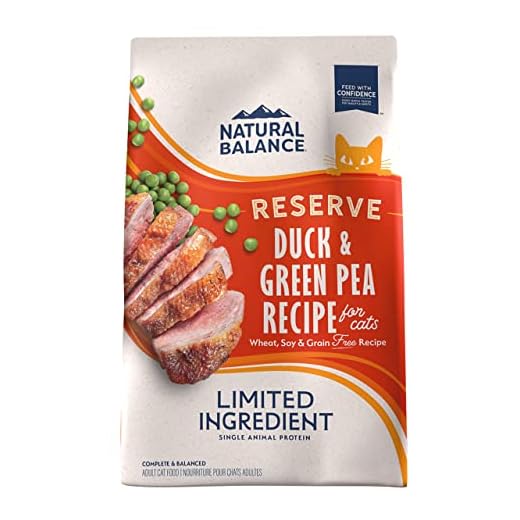




For those managing dietary sensitivities in their feline companions, I recommend focusing on high-quality options that prioritize minimal ingredients and hypoallergenic profiles. Selecting the right nutrition can significantly alleviate discomfort and improve overall health.
This article outlines various selections tailored for pets with sensitivities, providing insights into the ingredients and formulations that can help mitigate adverse reactions. Pet owners will find practical advice on recognizing symptoms of dietary issues and understanding what to look for in ingredients.
Included are specific brands and products known for their efficacy, along with detailed descriptions of their formulations. Each recommendation is backed by research and expert opinions, ensuring that you have reliable information at your fingertips.
By the end of this piece, readers will be equipped with the knowledge to make informed choices for their pets, leading to a happier and healthier life for their four-legged friends.
Best Choices for Cats with Food Sensitivities
Choosing the right nutrition for pets experiencing sensitivities is essential for their health. Selecting formulations that are free from common allergens can significantly improve their well-being and quality of life.
Prioritize products that feature limited ingredients, focusing on high-quality proteins and easily digestible carbohydrates. It’s advisable to avoid fillers and artificial additives, which can exacerbate sensitivities. Always consult a veterinarian before making changes to a pet’s diet to ensure it meets their specific needs.
Key Features to Consider
- Protein Sources: Look for single-source protein options to reduce exposure to allergens.
- Grain-Free Options: Many pets thrive on formulations that do not include grains, which can be problematic for some.
- Novel Ingredients: Ingredients such as duck, venison, or rabbit can be beneficial for pets with sensitivities to more common sources like chicken or beef.
- Probiotics: Formulations that include probiotics can support digestive health and improve nutrient absorption.
Always transition gradually to new products, monitoring for any adverse reactions. Keeping a food diary can help identify any triggers and track the pet’s response to new formulations.
| Consideration | Benefit |
|---|---|
| Limited Ingredients | Reduces risk of allergic reactions |
| High-Quality Proteins | Supports muscle health and energy |
| Natural Preservatives | Minimizes chemical exposure |
Incorporating these guidelines can lead to a healthier and more comfortable lifestyle for pets facing dietary challenges.
Identifying Common Allergens in Cat Food
Recognizing potential allergens in feline nourishment is vital for ensuring proper health and well-being. Many companions may not realize that certain components can trigger adverse reactions in their pets. By understanding these allergens, guardians can make informed choices to enhance their pet’s diet.
Common triggers often include specific proteins, grains, and additives. Allergic reactions may manifest as skin irritations, gastrointestinal disturbances, or respiratory issues. Identifying these allergens requires careful observation and sometimes consultation with a veterinarian.
Common Allergens
- Proteins: Chicken, beef, and fish are frequent sources of allergies. Alternative proteins like lamb or venison can be beneficial.
- Grains: Wheat, corn, and soy may lead to sensitivities. Grain-free options include peas, potatoes, or lentils.
- Additives: Artificial preservatives, colors, and flavors can cause reactions. Opting for natural ingredients can reduce risks.
To successfully identify allergens, it is recommended to keep a detailed diary of dietary changes and any related symptoms. This record helps pinpoint specific ingredients that may be problematic. Consulting with a veterinarian for allergy testing can also provide clarity on the most common allergens affecting a pet.
Switching to a limited-ingredient diet may assist in managing allergies. These diets often contain fewer components, making it easier to isolate and identify the offending ingredients. Gradual introduction of new items can help determine what is safe and what should be avoided.
Ultimately, understanding and recognizing common allergens empowers guardians to create a healthier and more suitable diet for their furry companions.
Grain-Free Formulas for Sensitive Felines
Grain-free options are often ideal for animals with sensitive digestive systems. These recipes typically rely on high-quality proteins and alternative carbohydrates, reducing the likelihood of allergic reactions.
When selecting a suitable blend, prioritize those that feature novel protein sources. Ingredients like salmon, duck, or rabbit can be beneficial, as they are less likely to trigger sensitivities compared to more common proteins.
Key Ingredients to Consider
- Protein Source: Look for named meats at the top of the ingredient list.
- Carbohydrate Alternatives: Sweet potatoes, peas, or lentils serve as excellent substitutes for grains.
- Omega Fatty Acids: Ingredients like fish oil contribute to skin and coat health.
- Digestive Aids: Probiotics and prebiotics support gut health and overall digestion.
Monitoring your companion’s response to new meals is crucial. Adjusting the diet based on their tolerance can lead to better health outcomes. Keep an eye on any changes in coat condition, energy levels, or gastrointestinal function.
Consulting a veterinarian can provide personalized recommendations tailored to specific health needs. Regular check-ups ensure that any dietary adjustments continue to support well-being.
Hypoallergenic Options: What to Look For
Choosing a suitable meal for pets facing dietary sensitivities requires careful evaluation of ingredients. Focus on options that utilize limited sources of protein and carbohydrates to minimize potential triggers.
Key components to consider include novel proteins, such as duck or venison, which are less likely to provoke reactions. Additionally, grain-free alternatives can offer relief for animals sensitive to traditional grains like wheat or corn.
Ingredient Analysis
When selecting a hypoallergenic product, scrutinize the ingredient list. Look for:
- Single Protein Source: Products that feature one primary protein can help isolate allergens.
- Low-Quality Fillers: Avoid meals with artificial additives or fillers that may exacerbate sensitivities.
- Digestive Health Support: Ingredients like prebiotics or probiotics can aid in digestion and improve gut health.
Furthermore, consider the manufacturing process. Options that undergo hydrolysis may break down proteins into smaller fragments, reducing the likelihood of adverse reactions.
Consultation and Testing
Before transitioning to a new diet, consulting with a veterinarian is advisable. They may suggest an elimination diet to identify specific allergens. This methodical approach can pinpoint problematic ingredients and guide the selection of suitable alternatives.
Monitor your pet closely during the transition. Noting any changes in behavior or health can provide valuable insights into the effectiveness of the new regimen.
Transitioning Your Cat to New Allergy-Friendly Diets
Begin the transition gradually to minimize gastrointestinal upset. Start by mixing a small amount of the new diet into the current meal, gradually increasing the proportion of the new nutrition over a week or two.
Monitor your feline’s reaction during this period. Look for signs of improvement or adverse reactions, such as vomiting, diarrhea, or skin irritations. Document any changes in behavior or health to discuss with your veterinarian.
Steps for a Smooth Transition
- Week 1: Mix 10-20% of the new product with 80-90% of the current one.
- Week 2: Increase the new option to 30-50%, reducing the previous one accordingly.
- Week 3: Offer 50-70% of the new diet if no adverse reactions were observed.
- Week 4: Transition to 100% of the new nutrition if your pet has adjusted well.
In cases of severe allergies, consult with a veterinarian for a tailored approach and possible elimination diets. Each feline has unique dietary needs and tolerances; thus, adjustments may be necessary based on individual reactions.
Maintaining a consistent feeding schedule will help establish routine and comfort during this transition. Always provide fresh water and observe your pet’s eating habits closely.
Best dry cat food for cats with food allergies
Features
| Part Number | 038100186034 |
| Model | 00038100186034 |
| Color | Other |
| Release Date | 2022-03-25T00:00:01Z |
| Size | 16 Pound (Pack of 1) |
Features
| Part Number | 70 |
| Model | 70 |
| Warranty | If you have a question that needs immediate attention, please call (800) 919-2833. |
| Color | Brown |
| Size | 12 Pound (Pack of 1) |
Features
| Part Number | NB52510 |
| Model | 52510 |
| Color | Blacks & Grays |
| Size | 10 Pound (Pack of 1) |
Features
| Part Number | 800111 |
| Model | 800111 |
| Color | 11 Lb |
| Size | 11 Pound (Pack of 1) |
Video:
FAQ:
What are the common ingredients in dry cat food for cats with food allergies?
Dry cat food specifically formulated for cats with food allergies typically avoids common allergens such as chicken, beef, and dairy. Instead, they often include alternative protein sources like turkey, duck, or fish. Additionally, these foods may use novel carbohydrates, such as sweet potatoes or peas, which are less likely to trigger allergic reactions. Grain-free options are also popular, as many cats are sensitive to grains like wheat or corn. Always check the ingredient list for any potential allergens and consult with a veterinarian for personalized recommendations.
How can I tell if my cat has a food allergy, and what steps should I take?
Signs of food allergies in cats can include itching, excessive grooming, skin irritations, gastrointestinal issues, or chronic ear infections. If you suspect your cat has a food allergy, the first step is to consult with your veterinarian. They may recommend an elimination diet, where you feed your cat a limited ingredient diet for a period of time to identify the allergen. After that, you can gradually reintroduce other foods to pinpoint the specific trigger. Keep in mind that diagnosis and treatment can take time, so patience is key during this process.








